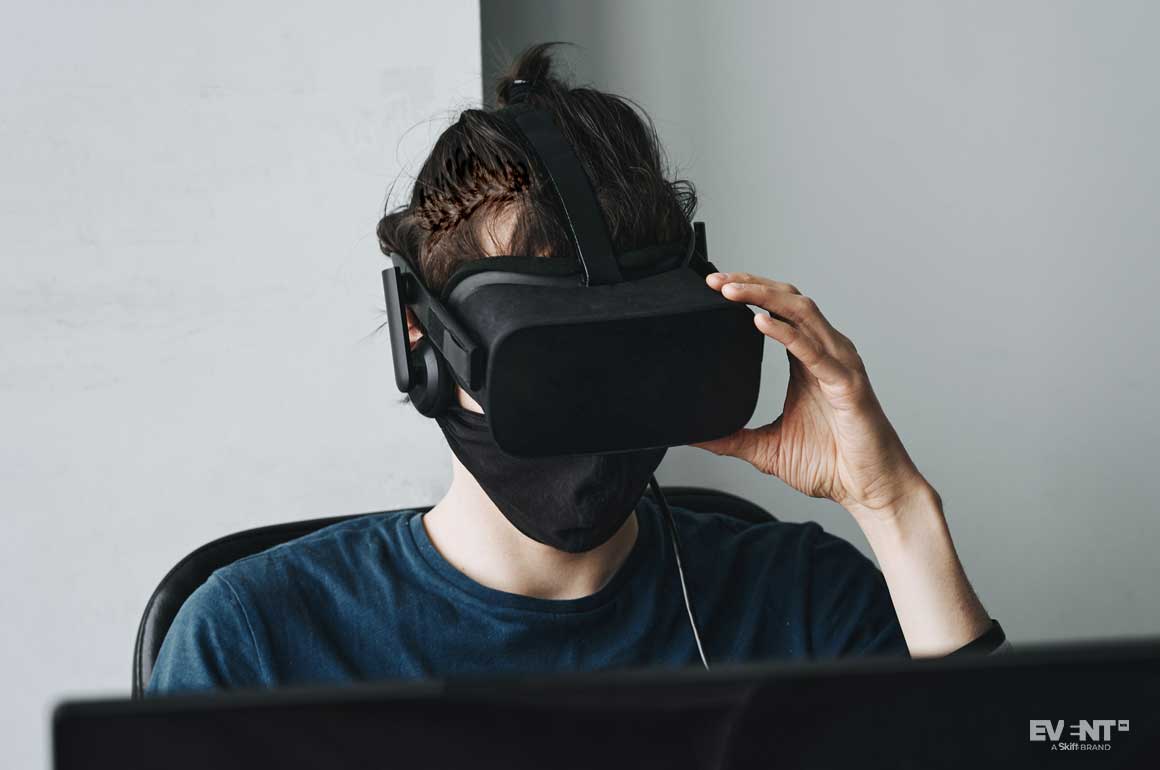VR technology has been around for a while now, and although it’s become more accessible to consumers in recent years with all-in-one headsets like the Oculus Quest, it still has yet to become mainstream. One of its most popular uses has historically been gaming, but VR also has many different applications across various industries, including, of course, events.
While the focus in the event industry over the past year hasn’t necessarily been on VR, there have been several notable VR experiences throughout the pandemic that will undoubtedly help propel the industry forward. One such example is musician Porter Robinson’s VR-enabled virtual festival, Secret Sky, which took place in April to celebrate the release of his new album, and drew 4 million viewers.
Several companies are clearly seeing the value in VR and continuing to invest in the technology — LA-based virtual concert company AmazeVR, for one, raised $9.5 million in April. The optimism seems justified when you consider that the size of the global VR market, currently estimated at $4.8 billion, is expected to grow to over $12 billion in the next three years.
Here’s a look at what some of these companies are working on, as well as the advantages and obstacles of VR for events.
VR Innovations in the Events Industry
VR is being developed for a wide range of use cases across the events industry, from business meetings to trade shows to concerts. The main advantage of VR events over classic virtual events is pretty straightforward: It allows attendees/users to feel like they’re in a physical environment with other people without actually being in the same physical space, which is clearly more immersive than interacting with others on a computer screen.
However, companies like MeetinVR — which is geared towards corporate meetings — and AmazeVR also showcase the tech’s advantages over typical, in-person events. For example, AmazeVR enables artists to perform against a green screen and design an entirely digital landscape created with special effects for their fans to experience.
Meanwhile, MeetinVR allows users to take advantage of the VR medium to collaborate more efficiently — by writing notes in mid-air, for example — and join diverse workspaces, including one in outer space.
In order to appeal to wider audiences, and perhaps to slowly introduce users to the possibilities of VR, certain platforms, such as exVo by Allseated and MootUp, provide immersive 3D environments for virtual events that can be accessed through both VR devices for those who have them, as well as through normal devices like smartphones and laptops.
These platforms can be used for all types of events but are particularly useful for trade shows and expos as they allow attendees to navigate through show floors and exhibitor booths, which has been one of the main weaknesses of many other virtual event platforms.
The Future of VR for Events
One of the biggest obstacles to VR currently is the hardware necessary to run it. For one thing, the headsets can be clunky and uncomfortable to wear for long periods of time.
They’re also expensive — the more affordable Oculus Quest 2 retails for about $300, while Apple’s rumored new VR headset may cost up to $3,000 upon release. Right now, most people don’t own a VR headset, and they’re not likely to purchase one specifically for an event. As a result, targeting corporate events in which companies may be able to buy a large amount wholesale and send them out to teams for use in multiple events might make sense, but the general conference crowd will not likely be a suitable segment until the devices themselves are more ubiquitous.
While VR technology can deliver pretty incredible and immersive experiences, it’s still far from being a normal way to consume content and attend events — but if these companies’ investments pan out, that may change in the future.
IN CONCLUSION
VR is still a relatively niche technology, but it is becoming increasingly mainstream, and many companies don’t see that trend stopping. When it comes to events, VR has wide-ranging applications and can offer various benefits over both in-person events and other virtual event formats.
That said, VR still has a relatively high barrier to entry for many, and for the time being, is likely better considered an option rather than the default format for events.
